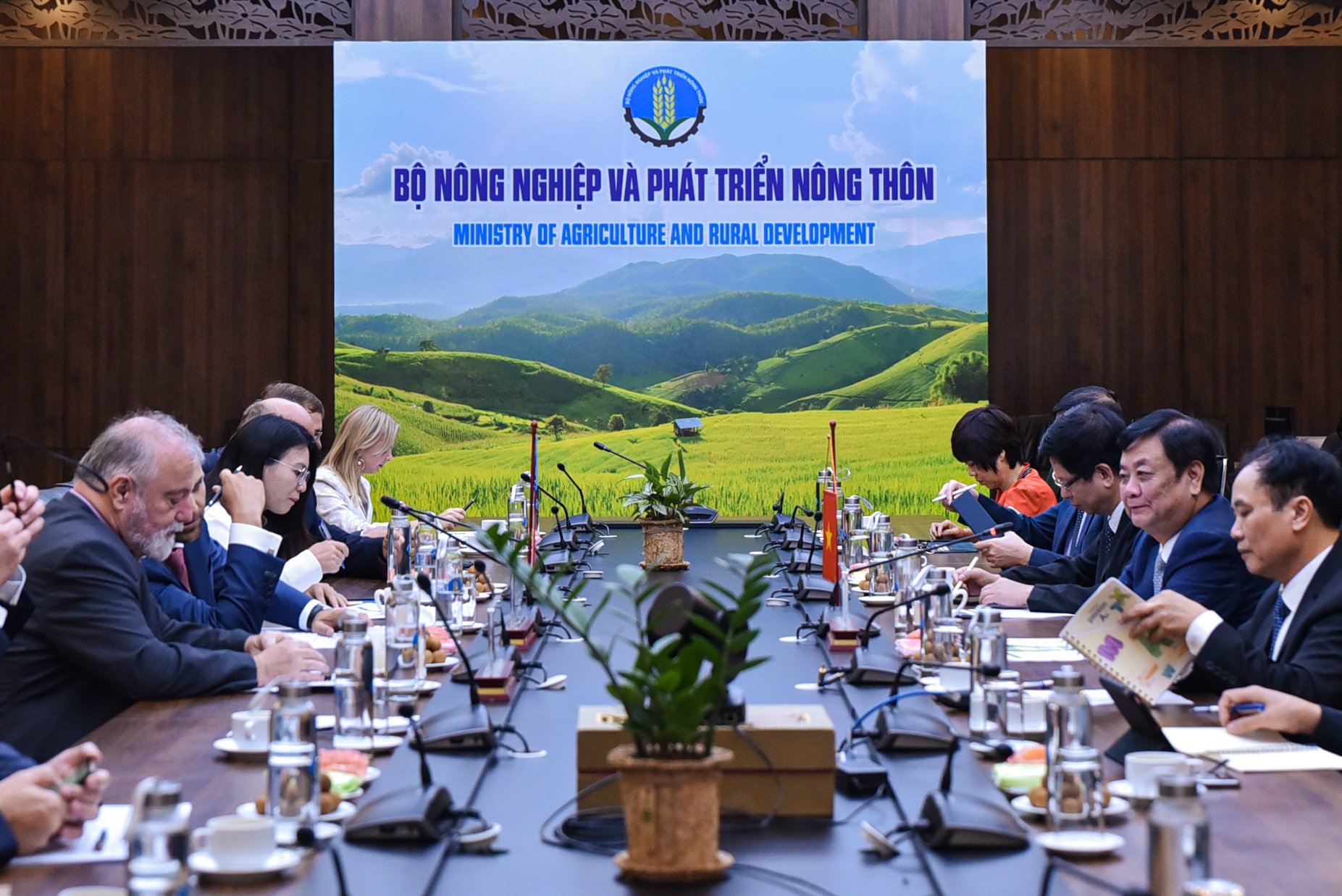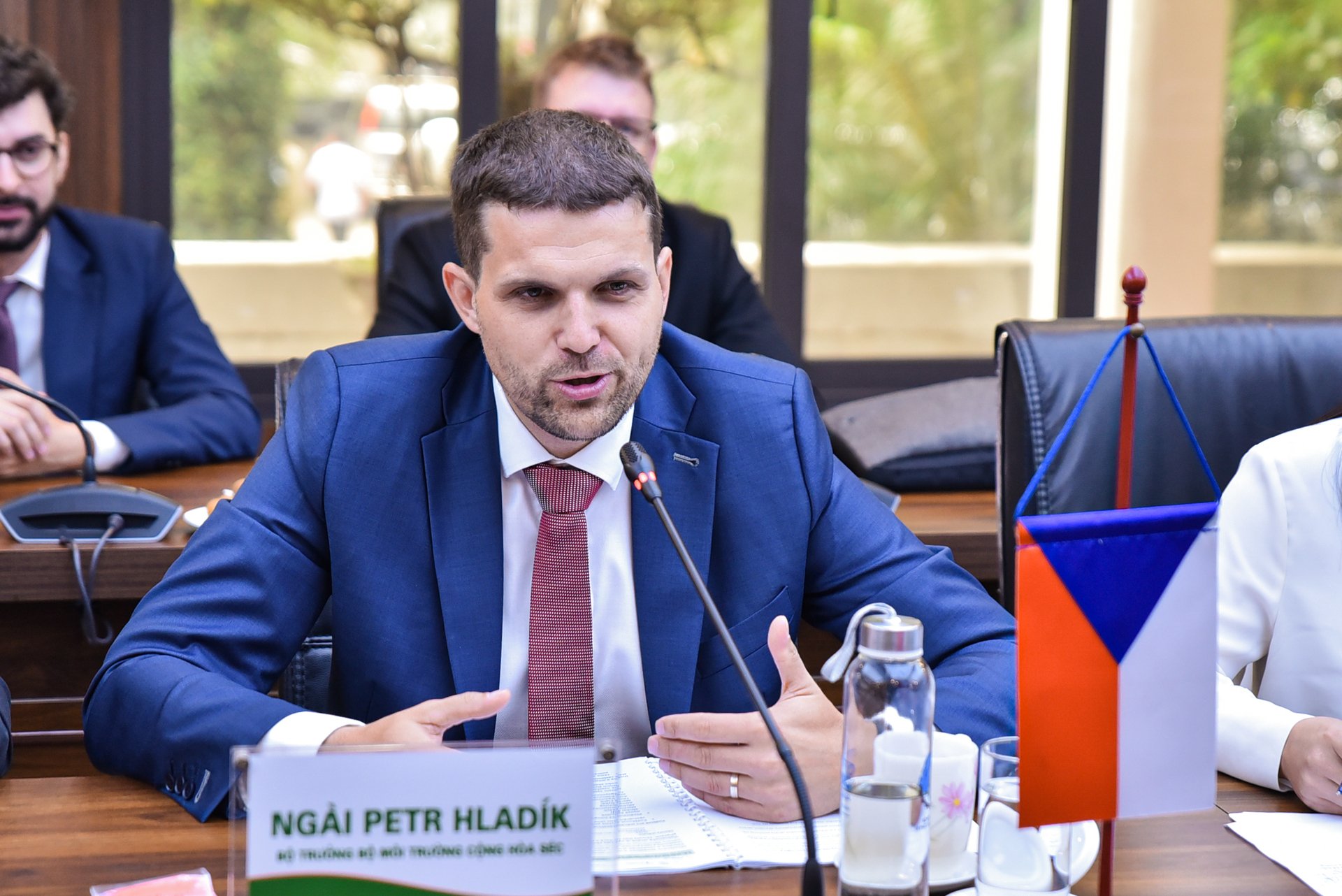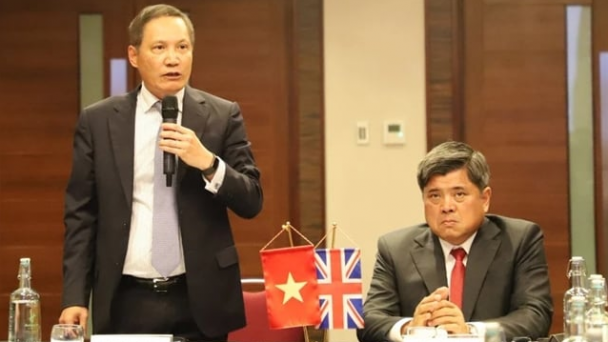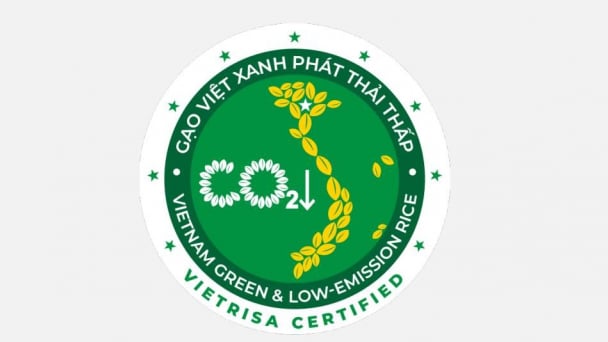May 16, 2025 | 10:14 GMT +7
May 16, 2025 | 10:14 GMT +7
Hotline: 0913.378.918
May 16, 2025 | 10:14 GMT +7
Hotline: 0913.378.918

The meeting on September 12 between the Ministry of Agriculture and Rural Development and the Minister of Environment of the Czech Republic. Photo: Hoai Tho.
On September 12 at the Ministry of Agriculture and Rural Development (MARD), Minister Le Minh Hoan meets and discusses with the Czech Minister of Environment, Mr. Petr Hladík. Also attending the meeting is Mr. Hynek Kmonicek, Ambassador Extraordinary and Plenipotentiary of the Czech Republic in Hanoi.
At the moment, the Vietnamese community in the Czech Republic has about 100,000 people. The Czech National Assembly has officially recognized this community as an ethnic minority. Not only that, there are more than 300,000 Vietnamese people who have studied and worked in the Czech Republic. These communities are vital factors that connect the two countries, a force in promoting bilateral trade and exchange.
Minister Le Minh Hoan considers the visit of the Czech Minister of Environment as marking a new chapter in international relations between the two countries.
“I appreciate that economic relations between the two countries are developing positively, with bilateral trade turnover in 2022 reaching about 828 million USD. Over the past years, bilateral cooperation on environment, agriculture and economics has achieved positive results, creating a solid foundation for future activities,” the Minister says.
Exemplarily, Vietnam and the Czech Republic are both members of the Convention on International Trade in Endangered Species of Wild Fauna and Flora (CITES).
Minister Petr Hladík proudly shares, “Over the past years, the Czech Republic has become a leading member in implementing CITES regulations. We are happy to share our experiences and knowledge with Vietnam and continue cooperating to raise awareness about preventing illegal wildlife trade.”

Minister Petr Hladík: We are happy to share our experiences with Vietnam and raise awareness about preventing illegal wildlife trade.” Photo: Quynh Chi.
Vietnam is currently refining policies to localize CITES-related processes. Minister Le Minh Hoan requests the Czech Republic to support policy advice and improve the effectiveness of implementing the Convention in Vietnam. Through EU funding, MARD also proposes that the Czech Republic coordinate with Vietnam to develop a joint project, implement demand reduction campaigns, and raise people’s awareness.
At the same time, in the context of global fluctuations, the two countries’ leaders highly appreciated the mutual efforts to protect the environment, respond to climate change, and implement the global goal of Net Zero Emissions in 2050 as agreed at COP26 in Glasgow.
Accordingly, the MARD hopes the Czech Ministry of Environment will cooperate in implementing activities, focusing on forestry development, industry restructuring, green growth, biodiversity protection, etc. Such projects will aim to implement international commitments and initiatives... In addition, the Ministry requested the Czech leaders to support the implementation of the Voluntary Partnership Agreement on Forest Law Enforcement, Forest Governance and Forest Product Trade (VPA/FLEGT) between Vietnam and the European Union.
With high-quality scientific research, the Czech Republic wishes to discuss measures and research concerning climate change with Vietnamese scientists. This knowledge exchange activity will help to realize the initiatives “Reducing global methane emissions” and “Glasgow Declaration on Forest and Land Use.”

MARD leaders take a commemorative photo with Czech Minister of Environment Petr Hladík. Photo: Quynh Chi.
In addition, agricultural trade between the two countries must be further promoted. Many Vietnamese agricultural products, such as shrimp and rice, are present in the Czech Republic, but the quantity is still limited. Vietnam’s agricultural products need to develop a stable and branded value chain.
On the other hand, Minister of Environment Petr Hladík proposes that Vietnam soon send a delegation of veterinary and livestock experts to conduct a survey, considering providing licenses for Czech pork, beef, and sausage products to be exported to Vietnam.
Ecotourism development was also a topic discussed at the meeting. The MARD leader proposes to strengthen cooperation in this field, improve management capacity, and promote tourism potential in each country. Minister Le Minh Hoan hopes to coordinate and organize promotional events for rural agricultural tourism.
The two leaders recognize that biodiversity, terrain diversity, and resource diversity are conditions for the sustainable development of agricultural ecosystems with unique natural products. Therefore, agricultural tourism development is identified as a solution to promote sustainable rural construction, contributing to global environmental protection efforts.
Translated by Quynh Chi

(VAN) Veterinary training should focus on quality, not just quantity. Veterinarians also need more options to pursue specialized training.

(VAN) The veterinary industry needs to be viewed objectively and further invested in to properly demonstrate its role and importance in the new context.

(VAN) The number of veterinarians graduating each year is not enough to meet actual needs, hence a difficult problem for the growing livestock industry.

(VAN) The strategic partnership between Cambodia, the Philippines, Vietnam, and CGIAR ensures that innovative solutions effectively address national priorities for food system development.

(VAN) This was affirmed by the UK Minister of State at the Department for Environment, Food and Rural Affairs during a working session with Deputy Minister Tran Thanh Nam on May 13.

(VAN) On May 13, the Ministry of Agriculture and Environment, in coordination with the Embassy of Vietnam in the United Kingdom, organized a seminar titled 'Connecting trade in Vietnam-UK agricultural, forestry, and fishery products'.

(VAN) The launch of the Vietnam green and low-emission rice brand is a positive signal for both businesses and farmers, marking readiness to reach new heights in the global market.